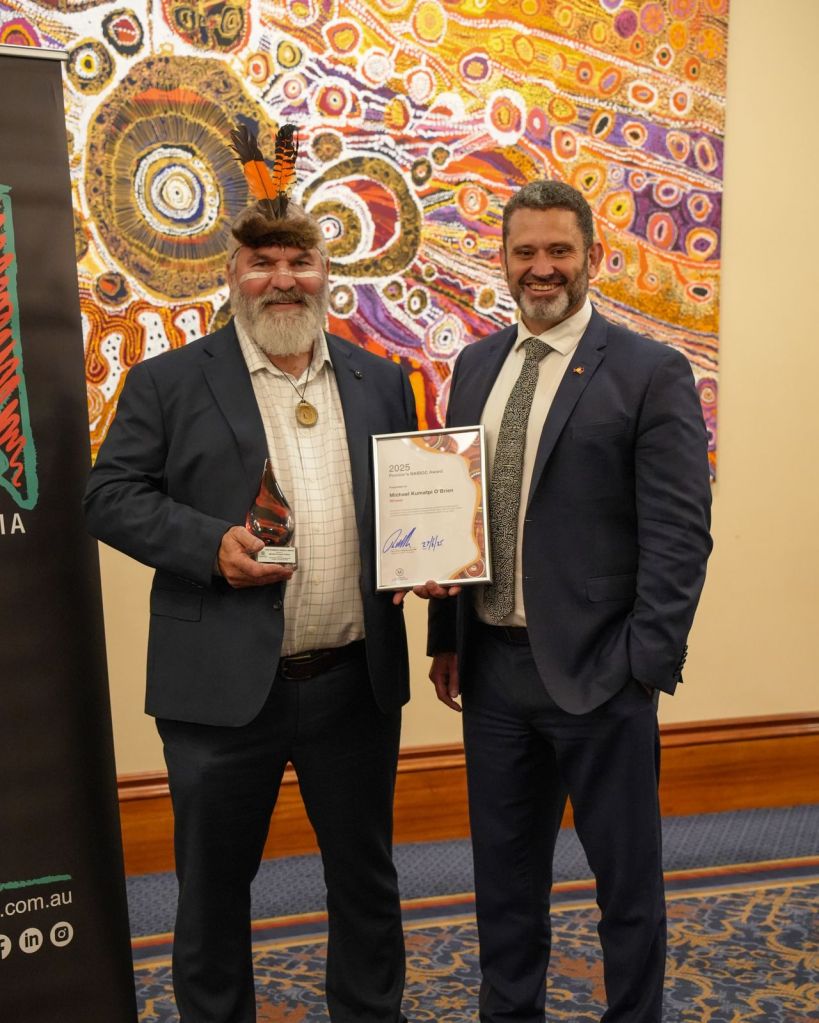SA NAIDOC award winners recognised
A cultural educator and a justice officer have won the Premier’s 2025 NAIDOC award, while another finalist drew attention to laws she said would “criminalise Aboriginal children”.

This year’s dual winners of the award are Kokatha, Wirangu woman Aunty Josephine Kunde and Kaurna, Narungga man Uncle Michael (Mickey) Kumatpi O’Brien.
Aboriginal Affairs Minister Kyam Maher said South Australia’s Aboriginal communities are supported thanks to their “tireless devotion and ongoing work”.
Kunde has worked as the Port Adelaide Nunga Court’s Aboriginal Justice Officer for 20 years, supporting Aboriginal court users and their families and assisting justice workers.
“Aunty Josephine’s knowledge, compassion and strength is invaluable to all in the Port Adelaide Nunga Court,” Maher said.
“Within her role, she ensures the court has a better understanding of Aboriginal culture and community, whilst supporting Aboriginal people to navigate and engage with the court system.”
O’Brien is a cultural educator and Kaurna ambassador, having worked in schools, with the History Trust, and as a board member of Kaurna Yerta Aboriginal Corporation.
In 2023, he was the first Aboriginal learning and development officer with the South Australian Police and helped the organisation address its failures when policing the Aboriginal community.
You might like

“Uncle Mickey is committed to keeping Kaurna traditional knowledge and practice alive through Welcomes to Country and smoking ceremonies. He works extensively with schools, heritage groups and government,” Maher said.
Year 12 Arabana, Afghan student Landon Kahn won the 2025 Dr Alice Alitya Rigney Prize, which recognises a young Aboriginal person in years 10-12 dedicated to their education.
“A good education is essential to getting the best possible start in life,” Maher said.
“Through his studies, his mentorship as a senior student at the Maree Aboriginal School, and his work in the community and commitment to family, Landon Khan is.”
Youth crimes concern cast shadow over awards
Other finalists for the 2025 Premier’s NAIDOC Award were Sonia Waters, Melissa Clarke, Gavin Wanganeen and Alfred Gollan.
Clarke is the National Aboriginal and Torres Strait Islander Legal Services (NATSILS) general manager and yesterday raised concerns with draft legislation she said will harm Aboriginal children.
Stay informed, daily
The draft laws would extend legislation to manage youth offending and “target and disrupt the criminal activities of street gangs”.
“I am being recognised for more than 25 years of work across justice, child protection, and systemic reform, but I am deeply disappointed that I continue to see laws put on the table that harm our kids and rob them of their childhood,” Clarke said.
“The Premier is handing out NAIDOC awards with one hand and writing laws to lock up First Nations children with the other.”
Clarke claimed the language of the bill was harmful because it assumes criminality, and would give police and courts power to detain children from just ten years old for up to three years if they breach a control order.
“The draft Serious and Organised Crime (Control) Amendment legislation is dangerous and will give police and courts the power to target children as young as 10 years old,” she said.
“This Bill allows police to label any group of three or more people as a ‘street gang’ based on their clothing, tattoos or other insignia, and presumes them to be affiliated ‘in the absence of proof to the contrary.
“This means that children who are seen together, wearing similar clothes including garments featuring Aboriginal colours, could be considered a gang and banned from seeing each other, banned from public places, and subjected to control orders—without ever being charged or convicted of a crime.”
A government spokesperson told InDaily the draft laws “only apply to gangs that exist for the purpose of committing serious criminal offences”.
“There is no legislation being proposed in South Australia which would criminalise the wearing of the Aboriginal colours,” the spokesperson said.
“The state government is committed to tackling the issue of street gangs.
“We are particularly concerned about a reported trend of adults recruiting children to become involved in criminal activity. This is why the draft bill includes a specific offence for recruiting another person to become a member of a street gang.”
The draft laws are currently out for consultation with stakeholders, and were designed with SAPOL’s input.
“The state government is also committed to diverting children and young people away from the criminal justice system,” the spokesperson said.
“We are investing $3 million toward intervention programs to break the cycle of offending among repeat young offenders.”








